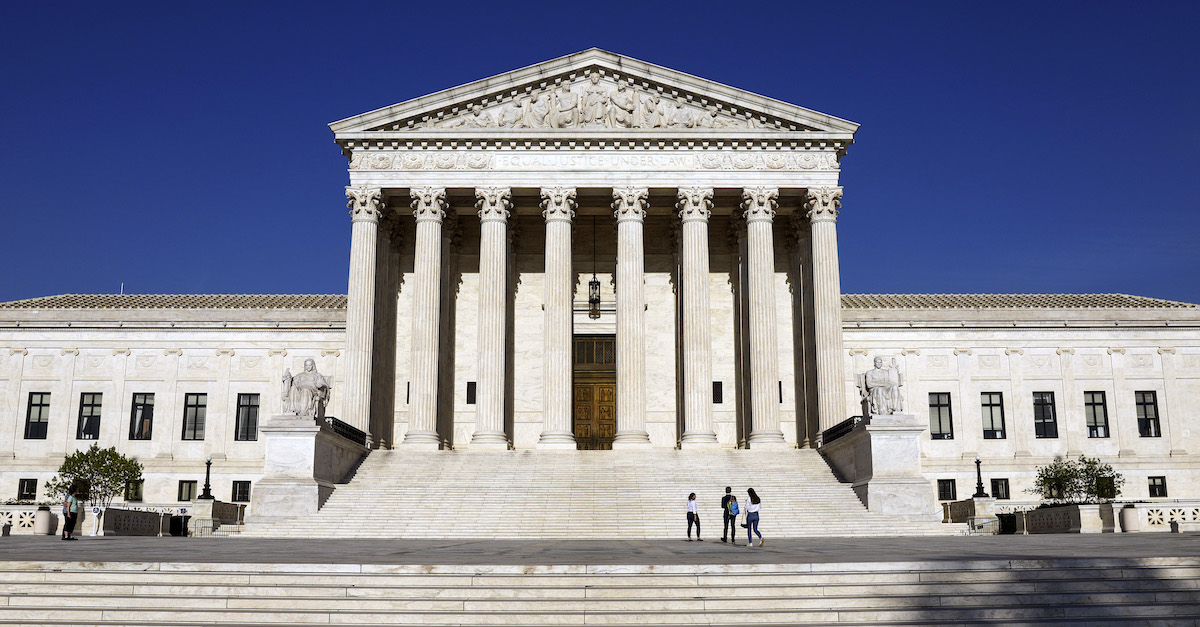
The U.S. Supreme Court.
The Supreme Court on Monday noted an original jurisdiction case is primed to hit its argument calendar, setting up the justices to revisit a theme of decades past: organized crime and corruption on the docks near the Statute of Liberty.
SCOTUS has “original jurisdiction” over disputes between states under Article III of the U.S. Constitution — meaning that if one state has a legal gripe with another, the Supreme Court is the trial court and not, as it usually is, a court of appeals. In these rare cases, the justices have the chance to act not only as arbiters of law, but as finders of fact.
In New York v. New Jersey, the Empire State filed suit to ask the justices whether the Garden State is legally permitted to withdraw from the 1953 congressionally-authorized Waterfront Commission Compact. The bi-state agreement was made to combat dockworker corruption and mob violence at the New York shoreline immortalized onscreen in On the Waterfront with Marlon Brando, Karl Malden, Rod Steiger, and Eva Marie Saint, a film adaptation of the Pulitzer Prize-winning stage production.
The two states entered into the agreement and each state passed its own statute to create the bi-state agency known as the Waterfront Commission of New York Harbor (WCNYH). Now, New York asks the justices for a declaratory judgment or an injunction that would prevent New Jersey from withdrawing from the agreement.
The WCNYH, which is led by two commissioners, one from each state, appointed by their respective governors, was created primarily as a response to rampant organized crime. The states found that port labor “was controlled by ‘criminals and persons notoriously lacking in moral character and integrity,’ resulting in ‘depressing and degrading’ conditions for workers.
The agency has the power to regulate the Port of New York and New Jersey, which is the approximately 25-mile radius encircling the Statue of Liberty. The port includes 700+ miles of navigable waterways along the shoreline of New York City and the “Gateway Region” of Northeastern New Jersey. As of August 2022, the region is the busiest port in the world.
Critics of the compact argue that the commission is no longer necessary and that its strict regulations are harmful to port commerce. New Jersey attempted to dissolve the NWCNYH in 2018, but then-Gov. Chris Christie (R) vetoed legislation that would have done so.
New York argues that if New Jersey is permitted to withdraw from the compact, it “will suffer substantial and irreparable harms” not only to its sovereign interests, but also to the “security and stability at the East Coast’s largest port—which has operated as a unified whole for over six decades.”
The Empire State says its neighbor cannot legally withdraw from the Commission and points to the WCNYH’s usefulness in curbing crime and other injustices:
The Commission has conducted hundreds of investigations, often in partnership with state or federal law-enforcement agencies, that have successfully led to convictions of individuals for drug trafficking, racketeering, and murder. The Commission also conducts background checks on potential port employees, using its intelligence capabilities and unique expertise to detect criminal ties and prevent members of organized crime families from infiltrating the Port. In recent years, the Commission has also worked to prevent discrimination and other unfair hiring practices.
New Jersey, on the other hand, argues that the Commission was only ever meant to be temporary. On the practical side, the Garden State says there is a “good reason why New Jersey has been diligently trying to withdraw from the Compact for four years,” namely that the WCNYH is “ineffectual.”
Per New Jersey’s brief:
Given commercial and technological changes, five out of six dockside jobs supervised by the Commission have disappeared. To justify its continued existence, the Commission has overregulated the port, stifling commerce and exacerbating worker shortages. Worse still, scandals have tainted the Commission’s work: a 2009 report by the New York Inspector General exposed a “climate of abuse” at the Commission, and problems persist today. In light of New York’s delay in filing suit, this Court should not require New Jersey to continue tolerating the Commission’s exercise of police powers within its borders.
The Supreme Court has not yet named an exact date for oral argument, but the high court ordered Monday that “cross-motions for judgment on the pleadings are set for oral argument in due course.”
Before the justices hear arguments, the WCNYH itself will file an amicus curiae brief in the case.
[Image via Kevin Dietsch/Getty Images]